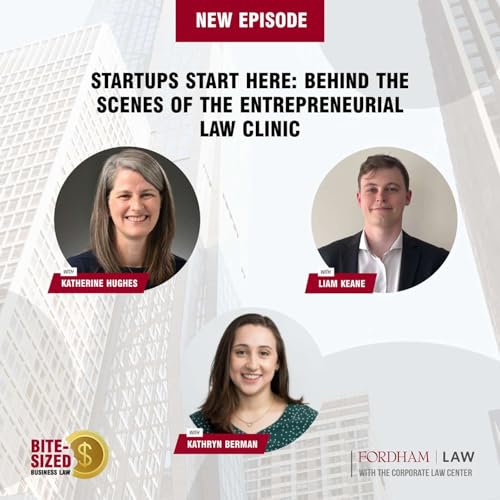
Bite-Sized Business Law
Échec de l'ajout au panier.
Échec de l'ajout à la liste d'envies.
Échec de la suppression de la liste d’envies.
Échec du suivi du balado
Ne plus suivre le balado a échoué
-
Narrateur(s):
À propos de cet audio
Looking for the latest in legal business news?
Get a breakdown of the top stories in business law from industry leaders on the front lines with Bite-Sized Business Law. Host Amy Martella takes a closer look at the latest corporate happenings through interviews with the attorneys, legal experts, public figures, and scholars behind the news to distill business law’s biggest stories into bite-sized portions.
This is your chance to go further into the world of business law and stay up to date with legal cases and industry trends.
Corporations impact us all, leading changes that extend far beyond business to shape the economy, public policy, technology, and beyond. Looking at the big picture, Amy discusses not only the underlying issues in business ethics and legal cases leading the biggest stories but also sparks thought-provoking discussions on where the law should be headed.
Amy is the Executive Director of the Corporate Law Center at Fordham University School of Law. Her background ranges from big law to government to tech startups, allowing her to offer an insider’s perspective of the issues that shape corporate actions, large and small. Covering crypto regulation to securities fraud, AI’s impact to Elon Musk’s pay package, Bite-Sized Business Law covers it all with guests of varying viewpoints to provide the nuanced analysis needed to tackle complex problems.
Whether you're looking for the latest in legal insight on intellectual property, mergers and acquisitions, business ethics or legal cases in the business law world, you’ll find it here. Enjoying a thoughtful perspective on the news stories of the moment, Bite-Sized Business Law examines big issues and delivers them in small doses.
Bite-Sized Business Law is a project by the Corporate Law Center at Fordham Law. The Center serves as a hub for scholars, professionals, policymakers, and students to engage in the study, discussion, and debate of current issues in corporate law. The Center focuses on aspects of corporate law, corporate compliance, antitrust law, and securities regulation. Through initiatives like the Mergers and Acquisitions seminar and the Securities Litigation and Arbitration Clinic, students actively engage in real-world research and cases, bridging the gap between classroom learning and practical application in the legal field.
© 2025 Copyright © 2023 Bite-Sized Business Law
-
 36 min
36 minÉchec de l'ajout au panier.
Veuillez réessayer plus tardÉchec de l'ajout à la liste d'envies.
Veuillez réessayer plus tardÉchec de la suppression de la liste d’envies.
Veuillez réessayer plus tardÉchec du suivi du balado
Ne plus suivre le balado a échoué
-
 Dec 9 202541 min
Dec 9 202541 minÉchec de l'ajout au panier.
Veuillez réessayer plus tardÉchec de l'ajout à la liste d'envies.
Veuillez réessayer plus tardÉchec de la suppression de la liste d’envies.
Veuillez réessayer plus tardÉchec du suivi du balado
Ne plus suivre le balado a échoué
-
 20 min
20 minÉchec de l'ajout au panier.
Veuillez réessayer plus tardÉchec de l'ajout à la liste d'envies.
Veuillez réessayer plus tardÉchec de la suppression de la liste d’envies.
Veuillez réessayer plus tardÉchec du suivi du balado
Ne plus suivre le balado a échoué


